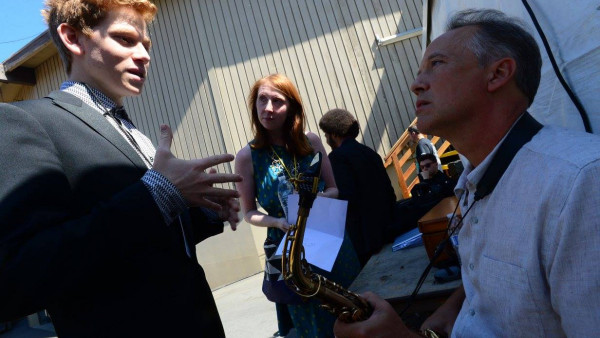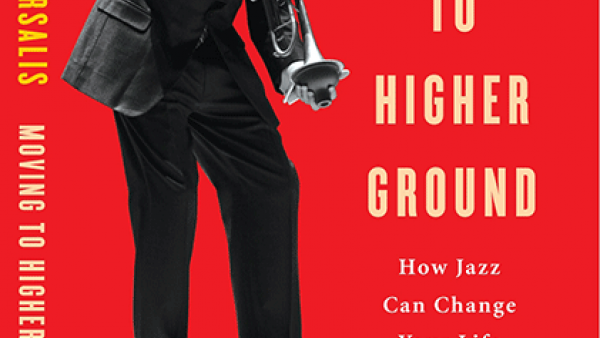The mad and maddening genius of Wynton Marsalis gets to the heart of the true all-American genre
Jazz is about what is,” says Wynton Marsalis.
The declaration, found in his excellent 2008 ode to jazz, Moving to Higher Ground: How Jazz Can Change Your Life, is open to as many interpretations as there are notes in a Charlie Parker bebop riff.
At one extreme, Marsalis is making the argument that jazz, which he considers “America’s greatest artistic contribution to the world,” is rooted in the black experience of America, and therefore inseparable from the fundamental American narrative of racial conflict and struggle. Jazz is what America is, an art form conceived out of our original slavery sin. It’s a proposition arguably more meaningful now than in 2008, after seven years of hostility to a black president and with the Black Lives Matter movement refocusing the nation’s attention on unfinished civil rights business. (For an example of Marsalis backing his rhetoric with his horn, listen to his terrific 2007 album From the Plantation to the Penitentiary.)
But at another extreme, Marsalis is simply talking about what happens in the moment of jazz creation, that happy sweet spot when a group of musicians listens to each other, responds to each other, and collaboratively comes to a musical consensus that swings. The improvisational moments of mutual discovery that grow out of the real-time interplay of horn and bass and drum – they’re impossible to define exactly, but every jazz musician is (or should be) always seeking to find where that “is” is at.
It is safe to say that no one alive today takes the meaning and practice of jazz more seriously or passionately than Wynton Marsalis, this year’s artist-in-residence at the Monterey Jazz Festival. Marsalis, the permanent director of Jazz at Lincoln Center, has at least 70 albums to his credit, six books, a fistful of Grammy awards, and more honorary degrees than you can shake a stick at. No one makes a better, more convincing argument about how essential and important jazz is, or should be, to the fabric of American cultural and artistic life. Marsalis is a tireless practitioner, preacher, teacher and proselytizer.
His performance of these roles is not without controversy. For not only is Marsalis endlessly willing to declaim on what jazz is, but he’s also not shy in deciding what it isnot. He is famously dismissive of jazz’s turn to the avant-garde in the 1960s and beyond – mourning, in particular, the experimental quest chosen by John Coltrane, considered by many one of the greatest jazz musicians of all time, in the latter part of his career. He also accused Miles Davis of selling out to rock and roll and sacrificing his talent in pursuit of money and fame. Marsalis hates fusion, has little time for hip hop, and even decries what many jazz fans no doubt consider an essential jazz format – the alternation of solos by trumpet, saxophone, bass and drums in the context of one particular melody. That’s not real jazz, argues Marsalis; soloing ignores the true interplay of musicianship, the collective coming-together of different agendas and ideas into one mighty swinging groove. Innovation for the sake of innovation, he repeats againand again, in interviews and his books, is not art.
If we could learn how to jam better together… we would achieve a more democratically progressive society.
The chutzpah implied by taking swings at Coltrane and Davis while waving off the entire evolution of jazz over the last 50 years has occasionally and understandably brought Marsalis under fire. The late jazz critic Harvey Pekar delivered probably the most sustained assault in 1998 when he attacked Marsalis as a “false messiah” who was “downright hostile to innovative musicians” but whose own music was “slickly imitative at best.” Pekar even quoted jazz saxophonist David Murray calling Marsalis a “neocon artist.” That had to hurt.
No doubt, Marsalis’ approach to jazz can be labeled “conservative.” His reverence for the masters, from Louis Armstrong and Duke Ellington to Charlie Parker and Dizzy Gillespie and the classic-era Coltrane and Miles Davis, and his willingness to work entirely within their ambit, has in the past left him open to the accusation that his conception of jazz is frozen in amber. Armstrong might as well be Beethoven or Bach in this formulation, a classical artist who isn’t necessarily part of a living tradition.
But as Marsalis explains it, his conservativeness is actually an expression of faith in classic jazz’s essential modernism. This is a modernism quite different than what we think of as “avant-garde.” For Marsalis, the whole idea of the avant-garde is an unnecessary European import, the result of European artists struggling under the weight of their classical patrimony. It completely misses the essential breakthrough that defines jazz. That improvisational structure? That collaborative coming together? Those are crucial modern breakthroughs. More importantly, they are breakthroughs that, properly applied, could be fundamentally progressive.
“The process of swinging,” writes Marsalis in Moving to Higher Ground, “of constant coordination with things that are changing all the time – is modern life in a free society… We need to bring swing back, not out of dumb, misguided nostalgia but because swing is a modern rhythm, much more suited to the increasingly integrated world of today than anything pounded out by a drum machine and recorded by people who are not even in the same studio together.”
Marsalis’ argument – that the idiom of jazz, the improvisational cooperation at the heart of swing – is the most appropriate musical art form for the multi-culti, politically antagonistic society so many of us find so disappointing today, is hardly conservative. It’s an inspiring act of democratic optimism. If we were better listeners and collaborators, more in tune with each other and more willing to sublimate our desires to where the music must go, we could break out of our partisan logjams, our prejudices and hatreds and stagnation. Here’s what Marsalis is preaching: If we could learn how to jam better together, if we could listen more acutely to what the masters were teaching us back in the day, we would achieve a more democratically progressive society. That’s the higher ground that jazz can take us to.
It’s a far more sophisticated argument than his critics give allowance for. But once you get that melody in your head, you can’t get it out.
The Jazz at Lincoln Center Orchestra with Wynton Marsalis plays at 10:20pm Sept. 19 at the Jimmy Lyons Stage and 6:30pm and 9pm Sept. 20 at Dizzy’s Den. www.montereyjazzfestival.org
by Andrew Leonard
Source: Monterey County Now


